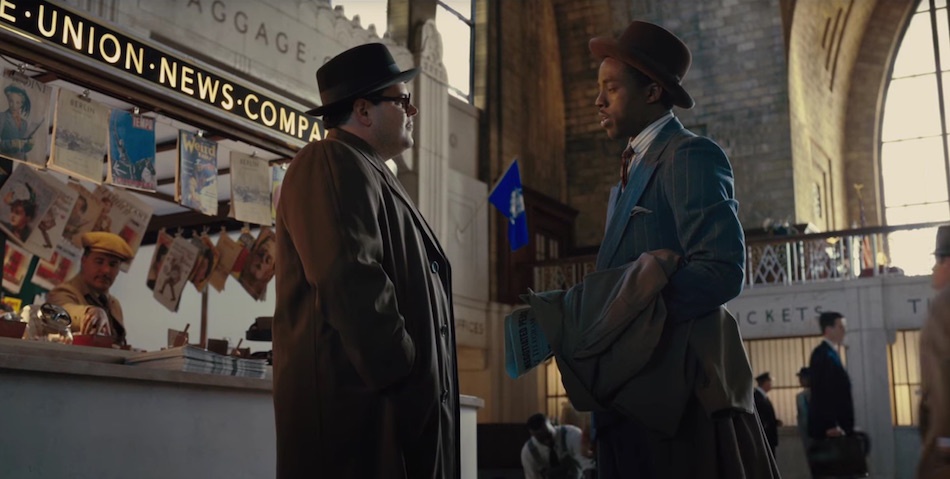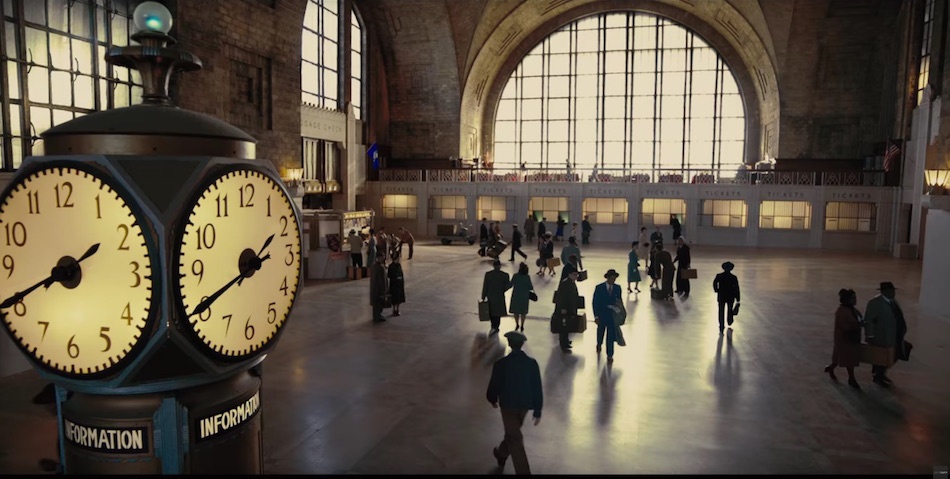“I welcome Keepsakes,” smiled Cynthia Farmer Streeter, ticking off a list of community organizations in attendance at Tuesday night’s advance screening of the Bridgeport-based biopic Marshall. “I welcome Perfect Blend! I welcome the NAACP!”
Streeter represented New Haven’s branch of the National Association of Negro Business and Professional Women’s Clubs, which helped organize the preview with the Elm City Youth Club for local teens, mentoring partnerships, and fraternal peer societies. Shown at Bow Tie Criterion Cinemas on Temple Street downtown, the film was followed by a Q&A with Marshall co-screenwriter and Connecticut attorney Michael Koskoff.
“You are the first youth to have seen this movie, because it has not opened yet,” said Koskoff afterwards. “You are the first high school group!”
The 118-minute historical courtroom drama follows a young Thurgood Marshall (Chadwick Boseman) and Bridgeport litigator Sam Friedman (Josh Gad) through their 1941 defense of chauffeur Martin Spell (Sterling K. Brown) against racially-motivated rape allegations from his employer, the white Connecticut socialite Eleanor Strubing (Kate Hudson).
“It’s about racism in the north,” Koskoff said at the preview. “Nobody does this! It’s always about some poor innocent guy in the south.” He offered up the stock tropes of Klansmen, the bigoted hayseed sheriff. “This is a northern racism—where everybody is on their best behavior.”

Thurgood Marshall (Chadwick Boseman) and Bridgeport litigator Sam Friedman (Josh Gad)
A NAACP trial lawyer from Harlem at the time, Marshall first enlists the unwilling Friedman to admit him to the regional bar as an out-of-area attorney. He quickly comes to rely upon Friedman as a mouthpiece and an ally when the presiding Judge Foster (James Cromwell) allows Marshall to represent Spell, but swears him to silence.
“How many of you knew anything about Thurgood Marshall?” Koskoff asked the crowd.
A forest of hands shot up. “And you knew he was the first black supreme court justice?” The hands stayed up. The response was weaker, however, when Koskoff asked about this unsung chapter in the justice’s life. “This is less well known!”
Speaking beforehand, Judge Robin Lynn Wilson of the New Haven District Superior Court mentioned how she hoped the film would help resident students understand the “work of Thurgood Marshall and his impact on race relations in Bridgeport.”
“He had the intellect, the fortitude, the—as I said—gazumbas,” she paused and grinned, reaching for a less exciting word, continued. “The tenacity to do what he did.”
From the film’s establishing shot, Marshall portrays its titular lawyer as kind of roaming crusader. At no small personal risk, he rockets out from the New York headquarters of a true-to-life justice league to fight for equality in America’s small towns. The first seconds linger lovingly over Marshall’s superheroic attributes: his clothes iron giving off a wispy, thinning cloud of steam; his gauzy, hand-pressed dress shirt and luscious silk tie; the gold NAACP seal tooled onto his heavy-latched leather attaché case.
Wilson said she was optimistic about the pre-screening’s potential to spread this story of inspired, itinerant activism. She added that the event was oversubscribed, with more people than could fit in the screening.
The evening’s first question cut straight down to Marshall’s character. “I was wondering why Chadwick was picked for this,” a student who introduced himself as simply "Michael" asked Michael Koskoff.

Koskoff explained how he had come to know Thurgood Marshall’s son well. In reference to Boseman’s upcoming lead role as Marvel’s Black Panther, Marshall’s son had asked: “He plays superheroes, right?”
The screenwriter went on to admit that there were a number of additional factors behind the casting decision. He listed Boseman’s versatility as an artist, his great work ethic, his erudition in reading up on the justice and becoming something of a Marshall scholar. Koskoff still returned, however, to the wandering-warrior archetype:
“We decided to call it Marshall because it’s like a western—the marshal who comes into town.”
True to form, Marshall the Marshal rides into the sunset. He leaves before closing arguments on fresh marching orders from the NAACP head office. The scene where Friedman struggles to tell Marshall the verdict by the weak connection of a scratchy rail station payphone begins comically but grades into wistful melancholy. Marshall’s faint voice finally fades away to a staticky dial tone, leaving Friedman with just the memory of a man who once confessed to him, “I need an army of lawyers like you, Sam.”
The local quality to Marshall runs deeper than the slightly vertiginous feeling one gets from seeing a Buffalo mock-up of New Haven’s Union Station, all stripped of its familiar concourse benches and model trains, a newspaper vendor where the Amtrak monitors should stand. Connecticut feels too much like a whistle-stop on Marshall’s itinerary. Friedman’s reluctance to get involved is a mix of the expected prejudices and a more pointed indignation at being a pawn in the NAACP’s national macro-politics—the sense that Bridgeport is a feather in Marshall’s cap.
Sam angrily warns Marshall, glowering and hissing: “I have to live in this city when this case is over!” He has his own battles to win, confronting casual, hometown antisemitism and smug Nazi sympathizers at the height of the Holocaust.
“This is not my problem,” Friedman growls. “The hell it isn’t,” replies Marshall. “It’s our problem, now.”
Another attending student wondered what made Koskoff “want to do something like this,” to team up with his son and drum up capital from Chinese investors to bring the script to the screen.
“Did it touch you?” the student asked.
Koskoff described how his friend, colleague, and legal scholar Jack Zeldes had uncovered the case down to its fine details: the highly personal debate between Marshall and Friedman regarding the selection of a white, southern juror; the hilariously startling way Friedman demonstrated the uselessness of a cloth gag submitted as evidence. Koskoff recalled how he, personally, had represented the Black Panthers in New Haven, defended Bridgeport’s black police and firefighters associations.
“I know the territory,” he said. “The case chose me. I know the courtroom. I’ve tried cases in the same courtroom. It’s about Bridgeport—it’s right where I live.”